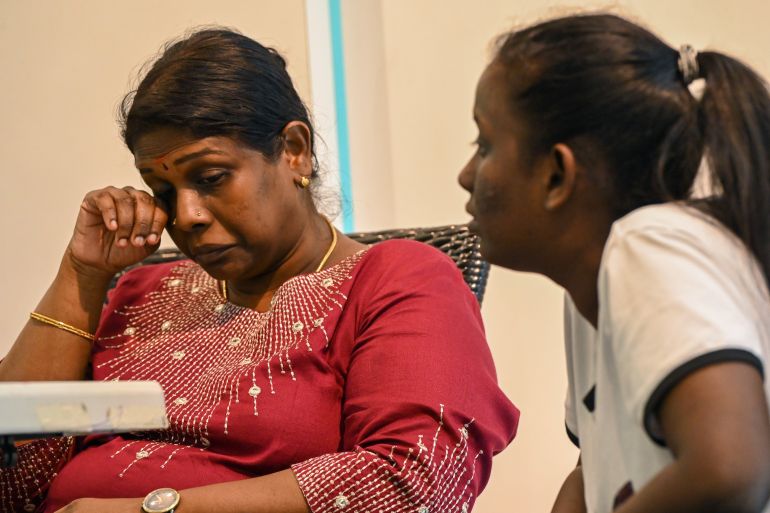Singapore hangs man for trafficking 1kg of cannabis
Family of Tangaraju Suppiah had pleaded for clemency, saying he had not had adequate legal counsel or an interpreter.

Singapore has hanged 46-year-old Tangaraju Suppiah who was found guilty in 2018 of trafficking more than 1kg (2.2 pounds) of cannabis, despite last-minute appeals for clemency from his family and activists.
His family said they had been given Tangaraju’s death certificate, anti-death penalty campaigner Kirsten Han wrote on Twitter.
Keep reading
list of 4 itemsSurge in executions of drug offenders in 2022, more on death row
Japan court backs retrial for 87-year-old death row inmate
Iranian-German man sentenced to death on ‘terrorism’ charges
A spokesperson for the country’s prison service told the AFP news agency that the sentence had been carried out at Changi prison in the island’s east.
Tangaraju Suppiah was sentenced to death in 2018 for abetting the attempted trafficking of just more than 1kg of cannabis. A judge found he was using a phone number that was communicating with traffickers attempting to smuggle the drugs into Singapore.
Tangaraju’s family and activists had argued the 46-year-old was not provided with adequate legal counsel and that he was denied access to a Tamil interpreter while being questioned by the police.
Human Rights Watch (HRW) Deputy Asia Director Phil Robertson deplored the execution and said the evidence against Tangaraju was “far from clear cut – since he never actually touched the marijuana in question, was questioned by police without a lawyer, and denied access to a Tamil interpreter when he asked for one”.
Amnesty International described the execution as “unlawful” and said that proceedings “violated international law and standards”.
The execution was the first in Singapore in six months after it carried out 11 death sentences last year.
An increasing number of Singaporeans have expressed concern about the use of the mandatory death penalty in drug cases with last year’s hanging of Nagaenthran Dharmalingam prompting rare protests in the tightly-controlled city-state.
Tangaraju was hanged in Changi Prison this morning. The family has been given the death certificate. https://t.co/Kjl1YauZ3P
— Kirsten Han 韩俐颖 (@kixes) April 26, 2023
The Singapore authorities executed Tangaraju s/o Suppiah today after he was convicted of trafficking just 1 kilogram of cannabis in proceedings that violated international human rights law and standards. 1/4https://t.co/ivoUKtpA0R
— amnestypress (@amnestypress) April 26, 2023
Singapore argues its tough stance is a deterrent to drug trafficking.
Responding to an appeal by British business tycoon Richard Branson on behalf of Tangaraju, the government said the case against him had been proved beyond all reasonable doubt and that the kilogram of cannabis would have been “sufficient to feed the addiction of about 150 abusers for a week”. It reiterated the need for its hardline policies.
“Our approach has worked for us, and we will continue charting our own path according to what is in the best interests of Singaporeans,” the Ministry of Home Affairs said in its statement.
But Dobby Chew, the executive coordinator of the Anti Death Penalty Asia Network (ADPAN), said recent executions had raised significant concerns.
Nagaenthran was executed although his IQ suggested an intellectual disability, he noted, while Kalwant Singh was hanged in July last year after cooperating with authorities and Tangaraju’s alleged co-conspirators who were caught with the drugs were jailed or given a discharge.
“None of these people are persons of significance in the grand scheme of drug trafficking operations in Singapore and yet, they are killed under the guise that it was necessary to protect Singapore,” Chew told Al Jazeera.
The United Nations says countries that retain the death penalty should use it only for the most serious crimes, which does not include drug offences. On Tuesday, it urged Singapore to halt Tangaraju’s execution.
“Singapore’s continued use of the death penalty for drug possession is a human rights outrage that makes much of the world recoil and wonder whether the image of modern, civilised Singapore is just a mirage,” HRW’s Robertson said.
Neighbouring Malaysia recently passed legal reforms to remove the mandatory death sentence for offences including drugs and give judges the discretion to decide on sentencing.
It currently has a moratorium on executions.